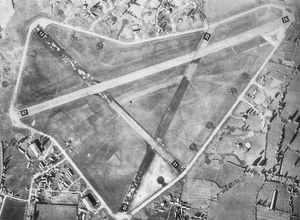RAF Keevil
|
RAF Keevil USAAF Station AAF-471  
|
|||||||||||||||||||
|---|---|---|---|---|---|---|---|---|---|---|---|---|---|---|---|---|---|---|---|

Keevil airfield on 4 November 1956. Note the secondary runways are deteriorating 11 years after the end of World War II; the main runway still being maintained as an auxiliary runway for the USAF.
|
|||||||||||||||||||
| Summary | |||||||||||||||||||
| Airport type | Military | ||||||||||||||||||
| Owner | Air Ministry | ||||||||||||||||||
| Operator |
United States Army Air Forces Royal Air Force |
||||||||||||||||||
| Location | Keevil, Wiltshire, United Kingdom | ||||||||||||||||||
| Built | 1941 | ||||||||||||||||||
| In use | 1942-1947 | ||||||||||||||||||
| Elevation AMSL | 39 ft / 12 m | ||||||||||||||||||
| Coordinates | 51°18′46″N 002°06′47″W / 51.31278°N 2.11306°WCoordinates: 51°18′46″N 002°06′47″W / 51.31278°N 2.11306°W | ||||||||||||||||||
| Map | |||||||||||||||||||
| Location in Wiltshire | |||||||||||||||||||
| Runways | |||||||||||||||||||
|
|||||||||||||||||||
Royal Air Force Station Keevil or more simply RAF Keevil is a former Royal Air Force station located 4 miles (6.4 km) east of Trowbridge, Wiltshire, England.
The airfield was built on a site previously ear-marked for the purpose in the mid-1930s. Consisting of 3 long concrete runways the airfield was used by the Royal Air Force and the United States Army Air Forces Eighth and Ninth Air Forces.
In 1942 Keevil airfield was provided to the USAAF and it was assigned USAAF designation 471 (KV).
The first American unit assigned to Keevil was the 62nd Troop Carrier Group, arriving at Keevil on 6 September 1942 from Florence AAF, South Carolina. The group consisted of the following operational squadrons:
The group transported military freight and supplies using C-47 and C-53 aircraft. The unit remained in England until 15 November until being transferred to Tafaraoui Airfield, Algeria as part of Twelfth Air Force.
After the departure of the transport group, Keevil saw the arrival of the 153rd Observation Squadron from the 67th Recon Group at RAF Membury in December 1942.
From Keevil the squadron flew a combination of Douglas Bostons, Douglas A-20 Havocs and Supermarine Spitfires. In March 1944 the 153d OS was disbanded, then re-formed for duties as the 2911th Bomb Squadron as a liaison and communications squadron, being equipped with Stinson L5s at RAF Erlestoke.
...
Wikipedia

